The discussion focused on the policies, standards, and partnerships necessary to confront biodiversity loss, climate change, and global inequality. From conservation and trade to corporate transformation, it examined how law, policy, and collaboration can contribute to building a sustainable and equitable future.
The session was opened by Christiane Wendehorst, Scientific Director of the European Law Institute and President, Division of Humanities and Social Sciences, Austrian Academy of Sciences who introduced the historical significance of the venue. The session was subsequently moderated by then ELI President Prof Pascal Pichonnaz. Adil Najam, President of the Worldwide Fund for Nature (WWF) International, reflected on the central role of conservation in addressing global challenges. He emphasised that law must take a leading role in confronting the greatest challenge of our time: climate change. President Najam reminded participants that nature is not external to humanity; it is fundamental to our existence. It is time, he argued, to understand the planet and its systems as interconnected, where people and nature are inseparable.
Virpi Stucki, Chief of the Division of Fair Production, Sustainability Standards and Trade at the United Nations Industrial Development Organization (UNIDO), offered insights from the industrial and trade perspective. She underlined that sustainable trade and production are not optional endeavours but essential imperatives for long-term prosperity and equity.
Anna Veneziano, Deputy Secretary-General of UNIDROIT and Deputy Director of the Roma Tre–UNIDROIT Centre for Transnational Commercial Law and International Arbitration, highlighted the crucial role of robust legal frameworks and coherent policy structures in furthering sustainability across sectors.
An engaging exchange of views followed, during which participants discussed a range of issues, including legal and policy dimensions of conservation and sustainable trade. The session concluded with the video

